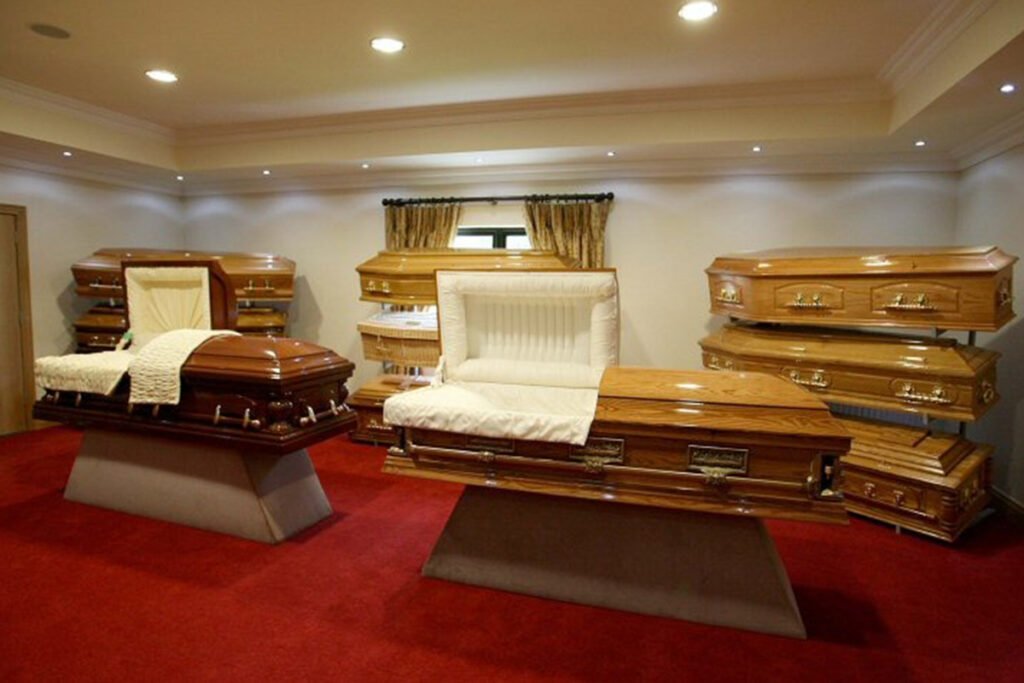Table of Contents
key Insights
- Coffin weight varies based on material: wood (150-250 pounds), metal (180-200 pounds), plywood, fiberboard, and cardboard (70-80 pounds).
- Coffin size, hardware, and decorative elements can all add weight.
- Internal materials such as thick rubber gaskets may add to the overall weight.
- Choosing the right casket is crucial to funeral planning, taking a variety of factors into consideration.
If you’ve attended a funeral before or seen a movie that contains a funeral scene, you’re probably familiar with the sight of pallbearers – typically six to eight people tasked with carrying a casket (at waist height or above their shoulders). At this point, you may be wondering: How much does the coffin weigh?

How much does the coffin weigh?
The answer depends on many different factors. The most important of these factors is the material used to construct the casket. There are many different types of caskets or casket materials, but the average casket weight may range from 160 pounds to 220 pounds.
wood. Wood is a common choice for coffin construction, often chosen for its sturdiness and attractiveness. Generally speaking, the average weight of a wooden casket can range from 150 to 250 pounds; of course, some types of wood are heavier than others. For example, a pine box (about 150 pounds) is relatively lightweight compared to mahogany (which can weigh up to 250 pounds) or cherry. Maple, walnut, and oak are also popular choices for caskets, weighing somewhere between pine and mahogany.
How much does the coffin weigh?
Metal. You might think that metal caskets are heavier than wooden caskets. But in practice, this is often not the case. Since metal is stronger than wood, it doesn’t need to be as thick as wood for stability. Therefore, the walls of a metal casket can be thinner, resulting in an average metal casket weighing around 180-200 pounds.
As with wood, there are many different types of metals used in coffin manufacturing. While 18-20 gauge steel is the most common material, stainless steel, copper, and even gold are also used in the construction of caskets. (As you can imagine, the gold box was very heavy and very expensive.)
A 20-gauge steel casket typically weighs around 170-190 pounds, as do stainless steel caskets.
Plywood, fiberboard and cardboard. Plywood and fiberboard caskets are a good choice for those looking for an economical and attractive option. These caskets are lighter than solid wood and are often made with a hardwood veneer or veneer that mimics solid wood. They can also be painted.
Sturdy cardboard coffins have the added advantage of being biodegradable, and many are made from recycled materials, making them an eco-friendly choice. If you plan to cremate your loved one, a cardboard casket is also a good choice because it is combustible. Not surprisingly, cardboard caskets are much lighter than heavy wooden caskets (70 to 80 pounds on average), but you can rest assured that a reputable cardboard casket manufacturer will never compromise on overall stability. They can also be covered with fabric for an elegant look.

Other factors in determining coffin weight
While the material a coffin is made of is arguably the most important indicator of a coffin’s weight, it’s not the only factor. Several other aspects of the coffin may also add to its overall weight. These include:
Coffin Dimensions. Oversized caskets can be purchased to accommodate taller or heavier bodies; due to their larger size, these caskets are heavier than standard caskets.
Hardware and decorative elements. Most caskets are equipped with hinges and clasps, as well as rods and handles to make lifting easier. This hardware can be very heavy, especially if it is made of brass or other solid metal.
Some people also choose to decorate the interior of their caskets with decorative panels, items of sentimental value, and other decorations – this may add to the overall weight of the casket, depending on their type and how they are made.
Interior materials. While the fabric inside a casket is rarely heavy enough to make a substantial difference, it can add to the overall weight of the container and thus the average weight of the casket. For example, thick rubber gaskets are often used to seal the casket and protect its interior from external elements.
Deciding on a casket is one of the most important aspects of funeral planning, and there are many factors to consider when making your choice. Understanding all of your options, including the weight of different caskets, can help you make a decision that’s right for you.
Regulations vary between jurisdictions. You should consult your local funeral professional for the most accurate and up-to-date information.
Plan your farewell in style – our pre-planned caskets give you peace of mind
Do you have any other questions? Resoul wood is committed to providing you with the answers you need. Let us be your trusted ally in planning the funeral you want at an affordable, fair price.





